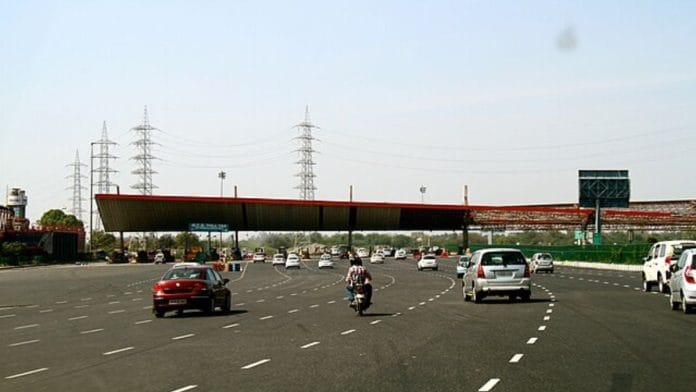New Delhi: A parliamentary panel looking into the levy of toll fee on national highways has come down heavily on the Ministry of Road Transport and Highways (MoRTH), saying that it is “unacceptable” that toll continues to be collected even in situations where “the essential service—namely, safe, uninterrupted, and timely travel—is not available”.
“This includes highway stretches that are incomplete, under prolonged construction, or marked by serious deficiencies in safety and traffic flow,” the Public Accounts Committee (PAC) led by Congress MP K.C. Venugopal said in its report tabled Tuesday.
Batting for establishing a tariff authority—on the lines of the Airports Economic Regulatory Authority in the civil aviation sector—to ensure transparency and fairness in toll fixation, collection and regulation, the panel noted, “While higher toll charges are justified during the period of concession agreement, continuation after that needs to be justified.”
The panel said that the authority should be mandated to review and determine the periodicity of toll revisions based on certain parameters.
The PAC has also pushed for rationalisation of toll collection on any highway stretch, and its substantial reduction once capital and routine maintenance costs have been recovered.
“Any continuation of tolls beyond this point should be permitted only if clearly justified and approved by the proposed independent oversight authority,” the PAC said in its report.
Noting that while toll rates are revised annually through a formula combining a fixed three percent increment with partial indexation to the Wholesale Price Index, the parliamentary panel said that there is no institutional mechanism to independently evaluate whether toll charges are justified in relation to actual operation and maintenance costs, or future service requirements.
“Continuing to levy toll without delivering the promised level of service violates both the user-pay principle embedded in Section 7 of the National Highways Act and the norms of fair commercial conduct envisaged under Section 10 of the NHAI Act,” the report reads.
Drawing parallels with the Income Tax framework, where the government has institutionalised a transparent and automated mechanism to process refunds to taxpayers in cases of excess deduction or payment, the panel further said, “Charging toll under these conditions not only violates the principle of quid pro quo but also undermines public confidence in the legitimacy of user charges.”
Also Read: Parl panel urges CCI to review deal value threshold, address lack of resources & funding concerns
‘Need to rationalise base rate’
Deposing before the PAC, MoRTH officials said that they have initiated a study with NITI Aayog to revise the user fee determination framework, including base rates, inflation indexing and concession structures.
“… all existing contracts and publicly funded toll plazas allowing tolling beyond cost recovery must be reviewed in light of these principles to safeguard user interest and uphold the principle of equity in public infrastructure usage,” the PAC said.
It further recommended that the ministry pursue the proposed study—being initiated through NITI Aayog in collaboration with reputed academic institutions—and ensure that it is time-bound and result-oriented.
The PAC also recommended that MoRTH and the National Highways Authority of India establish a clear, technology-driven and transparent mechanism for automatic toll refund or waiver in cases where the highway is “incomplete, unfit, or unavailable fully or under maintenance for use”.
“This system should be fully integrated with the electronic toll collection framework (e.g., FASTag) and designed to function without the need for user intervention, just as income tax refunds are processed and paid directly to taxpayers,” the PAC notes in its report.
Currently, there is a provision that if a four-lane road is getting converted to a six-lane road, the user fee is reduced to 75 percent. “It is because inconvenience is caused to the citizens while travelling on that road. And also, user fee is not increased till the completion of the upgradation,” the report notes. “If due to some reasons, we are not able to provide the land or the forest or environment clearance, in that case, the scheduled completion date gets extended and the concession of 75 percent continues till the completion of the road is achieved.”
(Edited by Mannat Chugh)
Also Read: Why 650 Haryana hospitals have halted AB-PMJAY services, in move set to hit 1.4 crore beneficiaries






